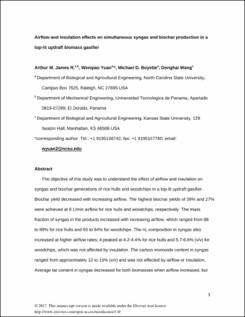Airflow and insulation effects on simultaneous syngas and biochar production in a top-lit updraft biomass gasifier
Fecha
2017-10-112017-10-11
Autor
James Rivas, Arthur
Yuan, Wenqiao
Wang, Donghai
Boyette, Michael D.
Metadatos
Mostrar el registro completo del ítemResumen
The objective of this study was to understand the effect of airflow and insulation on syngas and biochar generations of rice hulls and woodchips in a top-lit updraft gasifier. Biochar yield decreased with increasing airflow. The highest biochar yields of 39% and 27% were achieved at 8 L/min airflow for rice hulls and woodchips, respectively. The mass fraction of syngas in the products increased with increasing airflow, which ranged from 88–89% for rice hulls and 93–94% for woodchips. The H2 composition in syngas also increased at higher airflow rates; it peaked at 4.2–4.4% for rice hulls and 5.7–6.6% (v/v) for woodchips, which was not affected by insulation. The carbon monoxide content in syngas ranged from approximately 12 to 15% (v/v) and was not affected by airflow or insulation. Average tar content in syngas decreased for both biomasses when airflow increased, but adding insulation resulted in significantly higher tar content in syngas. The biomass type also had significant effects on gasifier performance. Biochar yields from rice hulls were greater than that from woodchips at all airflow rates. The lowest tar contents in syngas were approximately 1.16 and 11.88 g/m3 for rice hulls and woodchips, respectively.
